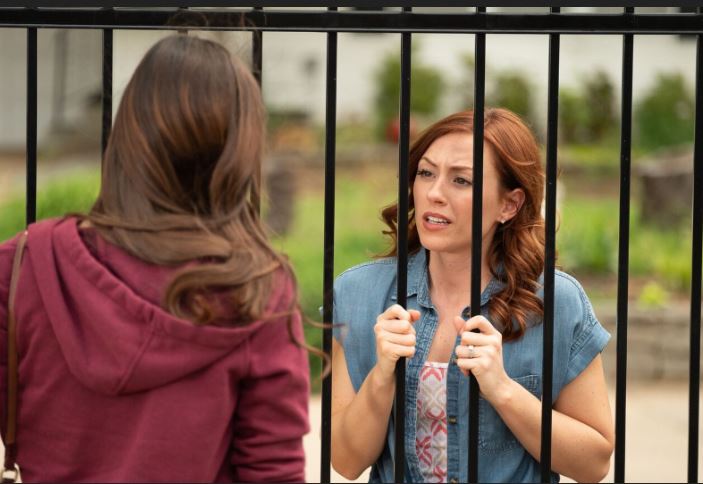Five Insights Gleaned From The Movie “Unplanned”
by Doug “Uncola” Lynn, The Burning Platform:
 Over the weekend, I was where I needed to pass some time and thought an early afternoon matinee would do the trick. Although I was not overly enthused to see any of the films currently showing, I chose to see “Unplanned“. Mainly because the title seemed apropos just then and the movie’s starting time fit my schedule. Moreover, it looked to be a political film about the controversial subject of abortion and was, in fact, based on a true story.
Over the weekend, I was where I needed to pass some time and thought an early afternoon matinee would do the trick. Although I was not overly enthused to see any of the films currently showing, I chose to see “Unplanned“. Mainly because the title seemed apropos just then and the movie’s starting time fit my schedule. Moreover, it looked to be a political film about the controversial subject of abortion and was, in fact, based on a true story.
The tale told of the life and times of Abby Johnson, a headstrong young lady from Texas who became one of the youngest Planned Parenthood clinic directors in the United States. She resigned in 2009 after seeing a fetus at 13 weeks gestation recoil in pain during an ultrasound-guided vacuum aspiration abortion.
The film portrayed the abortion industry, as exactly that, an industrywhereby Planned Parenthood profited most from procedures terminating pregnancies; even to the point of demanding quotas from its clinics. Furthermore, distinct and contrasting parallels were drawn between those who believed they were advocating on behalf of women’s rights with those who believed life began at conception.
In fact, the ideological boundaries in the film were literally, and figuratively, defined by an iron-barred fence standing just beyond the Planned Parenthood clinic doors in Bryan, Texas; a line of separation, as it were, between the near-medieval Mengele-like procedures inside and the loud protestations and prayers of the pro-life activists standing on the outside.
Here are five insights gleaned from the film:
1.) Our worldview is determined by what we think we see
In a recent article regarding “movies in the mind”, I wrote the following:
In every circumstance, our personal perceptions of identity are derived from the stories we tell ourselves. Of course, some of the narration may have originated from external sources but the feedback loops don’t become part our identity until we accept them readily into our ongoing internal dialogue…
Stories can bind or tear apart. They can soothe or roil individual relations, families, societies, and nations….
The stories in our heads play as movies in our minds; even to the point of framing our very identities.
And nowhere was this more evidently displayed than in the movie “Unplanned”, which was based upon Abby Johnson’s book of the same name about real people and events. Both her parents and husband did not approve of her career choice, primarily, because they believed babies were ordained by God in the womb. Actually, during the film, the audience saw Johnson’s family attending church together while hearing the pastor quote the Bible’s Psalm 139:13 as follows:
For you created my inmost being;
you knit me together in my mother’s womb.
At that time, Abby didn’t see that conception (pun intended). Instead, like most women’s rights advocates, she saw a fetus as merely a lump of cells, like a tumor sewn together by chance, with no value and feeling no pain when removed from the uterus.
Seeing is believing, and once we accept what we think we see, then that frame of reference becomes another allegorical bar in the metaphorical iron fence that defines, and defends, our worldview.

Decades before Donald Trump ever took the political stage, way before weapons of mass destruction or the stained-blue dress – abortion has divided America in two. It’s because people on both sides of the proverbial fence are seeing, and therefore believing, separate ideas.
Did God create humanity or did we evolve from the muck? Is a fetus a human baby or an exponentially accelerating mass of corpuscles? Whatever one sees will determine a specific ranking of internalized priorities and, in turn, also regulate each priority’s merit, or importance, or value.
2.) Our values derive from our worldview
Ethics are foundational to organizing society, just as morals are to a group or community, and as values define relationships. Each contain intrinsic principles paired to a scale. If values are determined, and ranked, by what individuals consider as most important – then these, most certainly, are sorted according to the stories we see in our heads; by our worldview.
Consider, as an example, the principle of honesty. If any accord is to be attained on honesty between individuals, then each party must value facts over falsehoods. This means they place a higher preference for truth above lies and, in so doing, the accord between the individuals would be determined as follows:
BEST: Both parties placing a higher priority on honesty/facts/truth
WORSE: One party placing a higher priority on honesty/facts/truth
WORST: Both parties placing a low priority on honesty/facts/truth
Between individuals, this scale of accord would determine the harmony of relationships; which, in turn, would translate into a moral code for a group or community, and, ultimately, a code of ethics for organizing society. Framed another way, the failures of accord in values might be identified as mistakes or insults or aggressions between individuals which could be perceived as crimes within the moral code of a given group and, even, the origins for warfare at the societal level.
All of which begins with value judgments determined by worldview.
In the film “Unplanned”, there are individuals who value what they perceive as children’s lives over convenience and others who value personal freedomover what they perceive as clumped-together cells.
For those who value life as something divinely-ordained, what God has clumped-together, let no man place asunder. If God is in charge, then the practical decision would be to set aside convenience and express one’s faith by trusting the divine plan; thus allowing the spirit of providence to turn the lemons of unplanned pregnancies into the lemonade of blessings in this life for the child, its mother, and/or the adoptive parents.
However, for those placing individual volition over unexpected tumors, the undeniable hassles of prenatal and neonatal aggravations, as well as the inconvenience of parental obligations – make abortions just plain more pragmatic. A little cash and, after a few hours at the clinic, life goes on. Certainly, for those peering through the fence and seeing a random universe, efficient practically represents the highest of ideals, does it not?
In any event, for those standing on either side of the figurative fence in the abortion debate: The end justifies the means.
3.) There are two sides to every story
—-SPOILERS AHEAD—-
In the narrative of her life, Abby Johnson revealed she had two abortions prior to volunteering at Planned Parenthood. One during college after a fling with the wrong guy and another after she married the same wrong guy against her parents wishes. Fortunately, for her, she later met the right guy who loved her unequivocally despite his disapproval of abortion in general and, specifically, his wife’s involvement with Planned Parenthood.
Now this guy was a real gem. He was patient, loving, God-fearing, and good for Abby. When she later became pregnant, the clinic director at the time expressed concerns a baby might interfere with Abby’s career and casually suggested that Abby should let the clinic “take care of it”. But Abby wanted to have the child. After all, she had a home now, a great husband, and her career. It was the right time.
Of course, the cold-as-ice clinic director’s instincts turned out to be valid as motherhood did, ultimately, affect Abby’s worldview. So much so, that later in the film, after Abby’s conversion from clinic director to pro-life advocate, she stood outside of the fence at the clinic and persuaded a young girl to keep her baby. Abby explained to the confused girl that she was once the clinic director there and what would happen once the young woman walked through the doors. First, the staff would do an ultrasound but they wouldn’t show it to the girl because they didn’t want to her to see her baby. The reason for the ultrasound was to measure the head of the baby so the staff could use the measurements in order to set the price for the procedure.

Naturally, that information would be enough to deter the faintest of hearts and the girl quickly exited the clinic grounds. Just then, the viewers saw the actress playing Abby smiling gratefully as the girl behind her, now on the other side of the fence, hurriedly drove away.
Do This Immediately if You Have Diabetes (Watch)
Healthier Patriot
For those who are pro-life, it was, no doubt, a profound and touching scene. Yet, for those remaining inside the fence, they would judge Abby a hypocrite. After all, she benefitted from the convenience of two abortions which allowed her the opportunity to get her life settled before the birth of her daughter. Yet, through persuasion, Abby denied that same convenience and opportunity to the confused young girl who then hastily retreated from the clinic grounds.
Undoubtedly, some viewers will wonder if Abby Johnson HAD given birth to her two aborted children, would she have finished college? Would her current and wonderful husband have been as interested in Abby had she been tugging two tykes in tow? Or knowing she gave them up for adoption?
Surely, in the minds of the “Unplanned” movie’s audience, the answers to those hypothetical questions will be determined by #’s 1 and 2 above.
4.) People have an infinite ability to rationalize anything
In psychoanalytical theory, “rationalization” is a cognitive defense mechanism against guilt. Or, for any parents who might be reading this, they may prefer the word “excuse”; although this blogger calls it “tortured logic” instead.
Generally, it tends to occur as follows:
Someone says: “I know this is wrong, or, at the very least, not right, but…” – and whatever comes next will be the (take your pick) rationalization, excuse, or tortured logic.
In “Unplanned”, Abby realizes while on the way to get her first abortion, she could not tell her Mom. Perhaps she’s even doing her mother a favor by not telling her. But, in the aftermath of a very unpleasant experience at the clinic where she terminated her first pregnancy, Abby commented in the film’s narration something similar to as follows (paraphrased): “Never do anything that you can’t tell your mom.”
Later, upon realizing she was pregnant for the second time, Abby opted for what she was told would be the “more private” option of terminating her pregnancy – by taking pills. She followed the clinic instructions, lay down on her bed at home, and mentally prepared herself for some mild discomfort. In this blogger’s opinion, what transpired onscreen next surpassed the “shower scene” in Alfred Hitchcock’s “Psycho”.
Yet, in spite of the devastatingly horrible experiences in terminating her two pregnancies, Abby later promoted the same procedures to other women; even lying at times and pressuring pre-teen and teen girls to have abortions. She did this while telling herself, and her family, it was all for the greater good.
In watching the events of “Unplanned” unreel, the rationalizations did, indeed, seem unreal, and I found myself considering, once again, the 1960s obedience experiments of social psychologist Stanley Milgram, including a 2017 article I wrote (in part) on Milgram entitled: “The ‘Experimenter’: Understanding Why Shit Happens and How Conformity Kills”. The closing lines of this article were as follows:
To understand the future we must look to the past. History repeats, thus, ignorance is no excuse. Multiple illustrations over the last century demonstrate how it often became fashionable for people to blindly submit to authority, or conform to group influence, instead of accepting the evidence of their own minds. This is, after all, how shit happens.
In his experiments, Milgram wanted to research how mass murder could be institutionalized; like manufacturing appliances. He described what he called an “Agentic State” whereby people become alienated from their own actions once they submit to authority. He also identified the “Agentic Mind”, which values obedience over common sense and/or compassion.
In “Unplanned”, the women were perpetually gullible – including those seeking abortions who blindly accepted what they were told in spite of their instincts; those who were never offered or cared to explore other options; those on the clinic staff who, after a day of terminating pregnancies, held a joyous baby shower for Abby after the doors were locked, and Abby herself who lied to her own daughter about the bloodstains on mom’s tennis shoes.
Overall, the film was a great reminder regarding the power of rationalization.
They did what they had to do. They believed the greater good was being served. They were told it was all okay.
5.) The Banality of Practicality is Progressive
It was interesting to hear Planned Parenthood’s biggest benefactors named in the film as “Soros, Gates, and Buffet”. Of course these “philanthropists” can take credit aiding and abetting the lifestyle choices and convenience of young women, while, at the same time, slowing the population growth of an entire generation of useless eaters.
Read More @ TheBurningPlatform.com
Loading...


